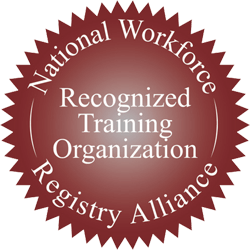Early Childhood Assistant Certification

By successfully completing this 12-week course, you will earn an IMC Early Childhood Assistant Teacher Credential for supporting teachers and children in a 3-6 years old classroom.
Next session: May 5, 2025
What to expect:
Approximately 8 hours of coursework each week including video viewing of Montessori lectures and lessons, online discussion forums, observation and or other practical assignments to put what you are learning in practice, journaling, and a 1 hour live video class in zoom each week.
Instructors:
Your course will be led by one of our experienced CGMS Instructional Guides. Video instructors include: Kitty Bravo, Tim Seldin, Cathie Perolman, Jana Morgan Herman, and Lorna McGrath.
Tuition: $810
If you have previously completed the Montessori Fundamentals Professional Development Course with CGMS, please contact admissions@cgms.edu for a payment link that will provide a discounted rate.
Week 1: Orientation
Week 2: In this week, you will study and learn about the history of the Montessori Method and Introduction to Philosophy and Theory
- Who is Maria Montessori?
- How did the Montessori method develop?
- Key principles of Montessori philosophy
Week 3: Studying more about Montessori and developing a deeper understanding of the philosophy
- Studying the guiding principles of the Montessori method
- What does it mean when we hear “Follow the Child?”
- What are “Sensitive Periods” in a child’s early development?
Week 4: The Classroom is a Prepared Environment
- Learn how and why this specifically prepared environment supports learning and development
- The outdoor environment is important and requires preparation and maintenance
- Observe classroom environments and discover specifics that aid the child’s independence and development
Week 5: Developing a Positive and Welcoming Classroom Culture and How to Observe a Classroom
- Creating a positive classroom culture with grace and courtesy and how do we demonstrate and model this with the children?
- Establishing a positive classroom tone
- Using Observation as your guide for supporting children
Week 6: Classroom Management and a Montessori Approach to Discipline
- What is positive discipline and how is it implemented?
- How do we redirect children’s behavior?
- Balancing freedom and responsibility
Week 7: Classroom Roles in the Early Childhood Classroom
- Learn about the roles and responsibilities of the lead teacher and the assistant teacher or guide
- Creating and defining the responsibilities for the team
- The importance of positive and frequent communication
Week 8: The Practical Life Area
- Learn about the importance of this area in the development of the child’s independence, order, concentration, and coordination
- Review some of the lessons given in this area
- Develop a list of your responsibilities in the practical life area
Week 9: The Sensorial Area
- Learn how these materials support the development of the intellect and prepare the child for math and language
- What’s a three-period lesson and how do we use that specific lesson?
- Develop a list of your specific responsibilities for the care of this area.
Week 10: The Math Area
- Discover how a child’s mathematical mind grows.
- See some of the important Montessori materials in this area.
- Create your list of responsibilities for the care of the math area.
Week 11: Language Area
- Discover why the classroom is a language-rich environment for children to develop vocabulary and a foundation for reading and writing.
- How is the sensitive period for language is the “just-right” time for learning letter sounds?
- How you can support language development and create a list of responsibilities for this area.
Week 12: Cultural Area and The Montessori Community
- What do children learn about geography, history, and science in this area and what responsibilities do you have?
- How do we create an environment where everyone is welcomed, accepted, and valued?
- Discover more about our own implicit biases and how these matter in our work.



